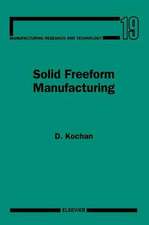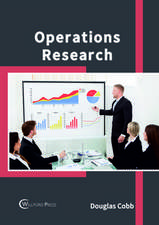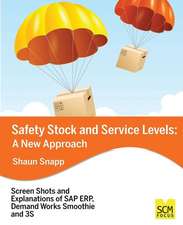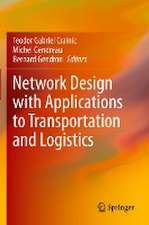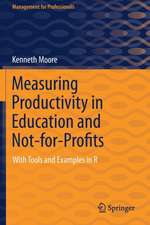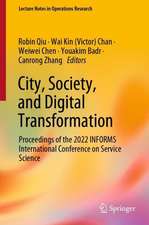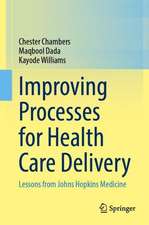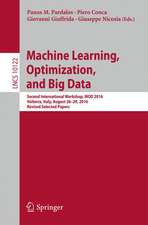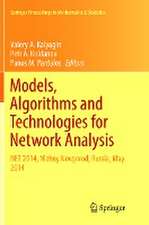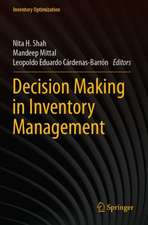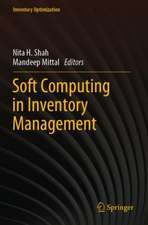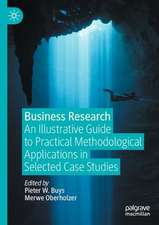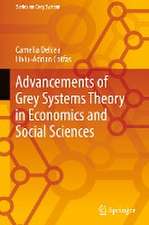Information and Communication Technologies for Agriculture—Theme IV: Actions: Springer Optimization and Its Applications, cartea 185
Editat de Dionysis D. Bochtis, Simon Pearson, Maria Lampridi, Vasso Marinoudi, Panos M. Pardalosen Limba Engleză Hardback – 8 mar 2022
This volume is the last (IV) of four under the main themes of Digitizing Agriculture and Information and Communication Technologies (ICT). The four volumes cover rapidly developing processes including Sensors (I), Data (II), Decision (III), and Actions (IV). Volumes are related to ‘digital transformation” within agricultural production and provision systems, and in the context of Smart Farming Technology and Knowledge-based Agriculture. Content spans broadly from data mining and visualization to big data analytics and decision making, alongside with the sustainability aspects stemming from the digital transformation of farming. The four volumes comprise the outcome of the 12th EFITA Congress, also incorporating chapters that originated from select presentations of the Congress.
The focus in this volume is on the directions of Agriculture 4.0 which incorporates the transition to a new era of action in the Agricultural sector, represented by the evolution of digital technologies in 4 aspects: Big Data, Open Data, Internet of Things (IoT), and Cloud Computing. Under the heading of “Action,” 14 Chapters investigate the implementation of cutting-edge technologies on real world applications. It will become apparent to the reader that the penetration of ICT in agriculture can result in several benefits related to the sustainability of the sector and to yield the maximum benefits, successful management is required. The entire discussion highlights the importance of proper education in the adoption of innovative technologies starting with the adaption of educational systems to the new era and moving to the familiarization of farmers to the new technologies.
This book covers topics that relate to the digital transformation of farming. It provides examples and case studies of this transformation from around the world, examines the process of diffusion of digital technologies, and assesses the current and future sustainability aspects of digital agriculture. More specifically, it deals with issues such as:
The focus in this volume is on the directions of Agriculture 4.0 which incorporates the transition to a new era of action in the Agricultural sector, represented by the evolution of digital technologies in 4 aspects: Big Data, Open Data, Internet of Things (IoT), and Cloud Computing. Under the heading of “Action,” 14 Chapters investigate the implementation of cutting-edge technologies on real world applications. It will become apparent to the reader that the penetration of ICT in agriculture can result in several benefits related to the sustainability of the sector and to yield the maximum benefits, successful management is required. The entire discussion highlights the importance of proper education in the adoption of innovative technologies starting with the adaption of educational systems to the new era and moving to the familiarization of farmers to the new technologies.
This book covers topics that relate to the digital transformation of farming. It provides examples and case studies of this transformation from around the world, examines the process of diffusion of digital technologies, and assesses the current and future sustainability aspects of digital agriculture. More specifically, it deals with issues such as:
- Challenges and opportunities from the transition to Agriculture 4.0
- Safety and health in agricultural work automation
- The role of digital farming on regional-spatial planning
- The enrollment of Social Media in IoT-based agriculture
- The role of education in digital agriculture
- Real-life implementation cases of smart agriculture around the world
| Toate formatele și edițiile | Preț | Express |
|---|---|---|
| Paperback (1) | 716.18 lei 6-8 săpt. | |
| Springer International Publishing – 9 mar 2023 | 716.18 lei 6-8 săpt. | |
| Hardback (1) | 721.50 lei 6-8 săpt. | |
| Springer International Publishing – 8 mar 2022 | 721.50 lei 6-8 săpt. |
Din seria Springer Optimization and Its Applications
- 15%
 Preț: 631.20 lei
Preț: 631.20 lei - 15%
 Preț: 653.42 lei
Preț: 653.42 lei - 18%
 Preț: 945.33 lei
Preț: 945.33 lei - 17%
 Preț: 360.79 lei
Preț: 360.79 lei - 13%
 Preț: 458.08 lei
Preț: 458.08 lei -
 Preț: 336.79 lei
Preț: 336.79 lei - 18%
 Preț: 774.64 lei
Preț: 774.64 lei - 17%
 Preț: 397.79 lei
Preț: 397.79 lei - 18%
 Preț: 1114.17 lei
Preț: 1114.17 lei - 15%
 Preț: 635.55 lei
Preț: 635.55 lei - 15%
 Preț: 636.50 lei
Preț: 636.50 lei -
 Preț: 393.78 lei
Preț: 393.78 lei -
 Preț: 373.51 lei
Preț: 373.51 lei -
 Preț: 383.90 lei
Preț: 383.90 lei -
 Preț: 388.48 lei
Preț: 388.48 lei -
 Preț: 537.09 lei
Preț: 537.09 lei - 15%
 Preț: 636.50 lei
Preț: 636.50 lei -
 Preț: 383.72 lei
Preț: 383.72 lei - 15%
 Preț: 638.91 lei
Preț: 638.91 lei - 24%
 Preț: 611.55 lei
Preț: 611.55 lei - 18%
 Preț: 956.21 lei
Preț: 956.21 lei - 20%
 Preț: 585.91 lei
Preț: 585.91 lei - 15%
 Preț: 698.12 lei
Preț: 698.12 lei - 18%
 Preț: 730.11 lei
Preț: 730.11 lei - 15%
 Preț: 647.16 lei
Preț: 647.16 lei - 15%
 Preț: 647.92 lei
Preț: 647.92 lei - 18%
 Preț: 732.60 lei
Preț: 732.60 lei - 15%
 Preț: 693.45 lei
Preț: 693.45 lei - 20%
 Preț: 581.07 lei
Preț: 581.07 lei
Preț: 721.50 lei
Preț vechi: 879.87 lei
-18% Nou
Puncte Express: 1082
Preț estimativ în valută:
138.14€ • 143.85$ • 114.62£
138.14€ • 143.85$ • 114.62£
Carte tipărită la comandă
Livrare economică 13-27 februarie
Preluare comenzi: 021 569.72.76
Specificații
ISBN-13: 9783030841553
ISBN-10: 3030841553
Pagini: 283
Ilustrații: XVIII, 283 p. 37 illus., 36 illus. in color.
Dimensiuni: 155 x 235 mm
Greutate: 0.62 kg
Ediția:1st ed. 2021
Editura: Springer International Publishing
Colecția Springer
Seria Springer Optimization and Its Applications
Locul publicării:Cham, Switzerland
ISBN-10: 3030841553
Pagini: 283
Ilustrații: XVIII, 283 p. 37 illus., 36 illus. in color.
Dimensiuni: 155 x 235 mm
Greutate: 0.62 kg
Ediția:1st ed. 2021
Editura: Springer International Publishing
Colecția Springer
Seria Springer Optimization and Its Applications
Locul publicării:Cham, Switzerland
Cuprins
Section I: Agriculture digital transformation and sustainability.- Towards Sustainable Agriculture: Challenges from the transition to the new digital era (Lampridi).- Sustainability in a Digital Farming Era: A Cyber-Physical Analysis Approach for Drone Applications in Agriculture 4.0 (Tsolakis).- Digital technologies in the context of energy: Focus on the developing world agriculture (Kyriakarakos).- A Circular Precision Farming System towards the optimization of dairy value-chains (Lampridi).- An analysis of safety and health issues in agriculture towards work automation (Benos).- Section IΙ: Agriculture digital transfor-mation around the world.- Smart farming as a game-changer for regional-spatial planning (Agostini).- Agriculture in Latin America: recent advances and food demands by 2050 (Soria-Ruiz).- The development opportunities of agri-food farms with digital transformation (Sturiale).- Precision Agriculture’s Economic Benefits in Greece: An Exploratory Statistical Analysis (Falaras).- Section III: Diffusion of agriculture digital transformation.- AI-based Chatbot System Integration to a Social Media Platform for Controlling IoT Devices in Smart Agriculture Facilities (Symeonaki).- IT in Education: Developing an online course (S. Zazueta).- Assisting DIY Agricultural Robots towards Their First Real-World Missions (Loukatos).- Evaluation of spray coverage and other spraying characteristics from ground and aerial sprayers (drones - UAVs) used in a high-density planting olive groves (Gertsis).- Predictive model for estimating the impact of technical issues on consumers interaction in agri-logistics websites (P. Sakas).
Notă biografică
Dionysis Bochtis works on the field of Systems Engineering for agricultural production under enhanced ICT, automation, and robotics technologies. His Research/Academic track-record includes positions such as: Director of the Institute for Bio-economy and Agri-technology (IBO / CERTH); Professor (Agri-Robotics) University of Lincoln, UK, and Senior Scientist (Operations Management), Aarhus University, Denmark. He is the founder of the agri-tech private company: farmB Digital Agriculture.
Panos M. Pardalos serves as distinguished professor of industrial and systems engineering at the University of Florida. Additionally, he is the Paul and Heidi Brown Preeminent Professor of industrial and systems engineering. Professor Pardalos is also an affiliated faculty member of the computer and information science department, the Hellenic Studies Center, and the biomedical engineering program. Additionally, he serves as the director of the Center for Applied Optimization. Professor Pardalos is a world leading expert in global and combinatorial optimization. His recent research interests include network design problems, optimization in telecommunications, ecommerce, data mining, biomedical applications, and massive computing. Panos Pardalos is a prolific author who lectures all over the world. He is the recipient of a multitude of fellowships and awards,the most recent of which is the Humboldt Research Award (2018).
Simon Pearson is Professor of Agricultural Technology at the University of Lincoln, UK, and the Founding Director of the Lincoln Institute of Agri-Food Technology (LIAT). His research area includes A diverse range of agri-technology applications including robotic systems, automation, energy control and management, food safety systems, and novel crop development. He run also positions such as Produce Technologists and Managing Director In various private sector companies.
Maria Lampridi is a Mechanical Engineer focusing, through her MSc and PhD studies, on Environmental Management and Sustainability. Main research areas include life cycle assessment of agricultural production systems and sustainability assessment of advanced agri-technologies as parts of these systems. Currently she is a Research Assistant in the Institute of Bio-economy and Agri-technology (iBO) of the Center for Research and Technology Hellas (CERTH).
Vasso Marinoudi works in Socio-technology Science (Bachelor’s degree Studies: American College of Greece – DEREE, Department of Sociology) focusing on the assessment of digitalization and robotization in agricultural production in terms of social sustainability and human-technology interaction (PhD’s Studies. Lincoln Institute for Agri-Food Technologies, Lincoln University). She is the Vice-CEO at Engineers for Business (EfB) S/A and is involved in various research projects at the R&D department of the company.
Textul de pe ultima copertă
This volume is the last (IV) of four under the main themes of Digitizing Agriculture and Information and Communication Technologies (ICT). The four volumes cover rapidly developing processes including Sensors (I), Data (II), Decision (III), and Actions (IV). Volumes are related to ‘digital transformation” within agricultural production and provision systems, and in the context of Smart Farming Technology and Knowledge-based Agriculture. Content spans broadly from data mining and visualization to big data analytics and decision making, alongside with the sustainability aspects stemming from the digital transformation of farming. The four volumes comprise the outcome of the 12th EFITA Congress, also incorporating chapters that originated from select presentations of the Congress.
The focus in this volume is on the directions of Agriculture 4.0 which incorporates the transition to a new era of action in the Agricultural sector, represented by the evolution of digitaltechnologies in 4 aspects: Big Data, Open Data, Internet of Things (IoT), and Cloud Computing. Under the heading of “Action,” 14 Chapters investigate the implementation of cutting-edge technologies on real world applications. It will become apparent to the reader that the penetration of ICT in agriculture can result in several benefits related to the sustainability of the sector and to yield the maximum benefits, successful management is required. The entire discussion highlights the importance of proper education in the adoption of innovative technologies starting with the adaption of educational systems to the new era and moving to the familiarization of farmers to the new technologies.
This book covers topics that relate to the digital transformation of farming. It provides examples and case studies of this transformation from around the world, examines the process of diffusion of digital technologies, and assesses the current and future sustainability aspects ofdigital agriculture. More specifically, it deals with issues such as:
The focus in this volume is on the directions of Agriculture 4.0 which incorporates the transition to a new era of action in the Agricultural sector, represented by the evolution of digitaltechnologies in 4 aspects: Big Data, Open Data, Internet of Things (IoT), and Cloud Computing. Under the heading of “Action,” 14 Chapters investigate the implementation of cutting-edge technologies on real world applications. It will become apparent to the reader that the penetration of ICT in agriculture can result in several benefits related to the sustainability of the sector and to yield the maximum benefits, successful management is required. The entire discussion highlights the importance of proper education in the adoption of innovative technologies starting with the adaption of educational systems to the new era and moving to the familiarization of farmers to the new technologies.
This book covers topics that relate to the digital transformation of farming. It provides examples and case studies of this transformation from around the world, examines the process of diffusion of digital technologies, and assesses the current and future sustainability aspects ofdigital agriculture. More specifically, it deals with issues such as:
- Challenges and opportunities from the transition to Agriculture 4.0
- Safety and health in agricultural work automation
- The role of digital farming on regional-spatial planning
- The enrollment of Social Media in IoT-based agriculture
- The role of education in digital agriculture
- Real-life implementation cases of smart agriculture around the world
Caracteristici
Covers the process of digital transformation of farming providing case studies around the world and paradigms of actual implementation of advanced technologies in agriculture Asses the current and future sustainability issues arise from “Agriculture 4.0” and examines the process of diffusion of digital technologies Chapters’ authors are leading experts in the field of digital farming, providing high-end knowledge


